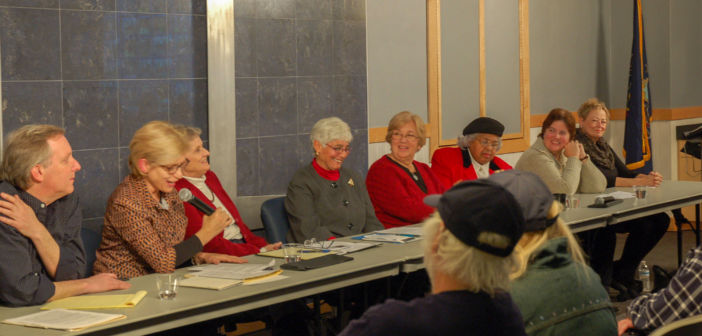Lehigh’s South Side Initiative and the Steelworker’s Archives brought together a panel of women to tell their stories about Bethlehem Steel on Dec. 2.
The panel consisted of six women: Iva Ferris, an electrical shop apprentice; Iris Linares, a United Steelworkers officer; Bess King, an ore handler and millwright apprentice; Esther Lee, the former president of the Bethlehem NAACP; Judy Hoffert, whose husband, Jeff, was a steelworker; and Connie Fuller, who was a sales department manager.
“Part of what Friday’s event was about was to bring university professors, graduate students, undergraduates, and staff people together with community members,” said Seth Moglen, the associate professor of English, “in order to talk about what women have accomplished, what challenges they faced and how we create more vibrant flourishing futures for all of us.”
The women told their stories of how Bethlehem Steel affected their lives.
“These are the kind of things we are trying to do at the Steelworkers Archives,” said Frank Behum, the president of the Steelworkers Archive. “Our goal is to get the message out so that people can learn from history.”
The women discussed challenges they faced, the difficulty of closures and the positive aspects of the plant. One of those problems was working in a predominantly male environment.
Lee recalled a time when she heard a young female secretary screaming because one of the bosses was trying to seduce her. The boss was reported and transferred. Lee said this was unfortunate, and it is important for women to stick together during these times.
Fuller said one of the managers would assign her his own work to complete and would then claim Fuller’s work as his own. Fuller said this occurred twice, and after she spoke to her boss about the situation, it never happened again.
King said when she got pregnant, Bethlehem Steel told her to take a year of absence without pay. She said she was very distraught because she could not afford to take an entire year off of work. Behum, her shop steward at the time, helped negotiate her conditions to allow for King to take sick leave until her daughter was 8-weeks old.
The women said they also dealt with layoffs.
After Ferris received her apprenticeship, many of her male colleagues were jealous only women were granted this position and would often create trouble for the women apprentices. Ferris recalled the men harassing her and pouring crude oil in her toolbox.
During layoffs, every apprentice was kept with the plant except for the women electrical engineers. Ferris and others filed a lawsuit against Bethlehem Steel because of these discriminatory layoffs. They won the case.
Hoffert’s husband, Jeff, was told in order to receive his pension, he would need to work in Sparrow Point Plant in Baltimore, after the primary steel operations, or “the hot end,” of Bethlehem Steel closed in 1995.
The Hofferts left their home and moved to Baltimore where Jeff Hoffert was to work for seven years until he received his pension. While her husband worked at the plant, Judy worked at a crime-ridden CVS.
“I had to call the police at least six or seven times a day,” Judy Hoffert said.
After living in Baltimore for six years, 11 months and 10 days, Jeff Hoffert’s pension contract was dropped. He was 20 days short of receiving his pension.
During layoffs, Linares helped many of these individuals as she worked at the Dislocated Workers Association. Linares said she often provided emotional support to the workers.
The women said they also had positive experiences with Bethlehem Steel.
“The money!” Ferris said. King said her old job paid $2.25 an hour, so upgrading to $8.50 an hour was a big change.
The panel was used in part to spark interest for Lehigh’s new website on the digital library, Beyond Steel. The website tells the stories of the six panelists and also gives the stories of an additional 29 women.
The website, which was funded through Lehigh’s South Side initiative and the Mellon Digital Humanities Initiative, features 35 interviews, some of which date back to 1975.
Julia Maserjian, the leader of Lehigh’s digital scholarship team, said in the future, the team would like to host a similar event, but in a less formal matter, such as a roundtable discussion.
“I think it is a wonderful way to empower people,” Maserjian said. “Oral history allows people to tell their own stories. You can get this history in textbooks or in articles, but to allow people to tell their own story is a great benefit.”






Comment policy
Comments posted to The Brown and White website are reviewed by a moderator before being approved. Incendiary speech or harassing language, including comments targeted at individuals, may be deemed unacceptable and not published. Spam and other soliciting will also be declined.
The Brown and White also reserves the right to not publish entirely anonymous comments.